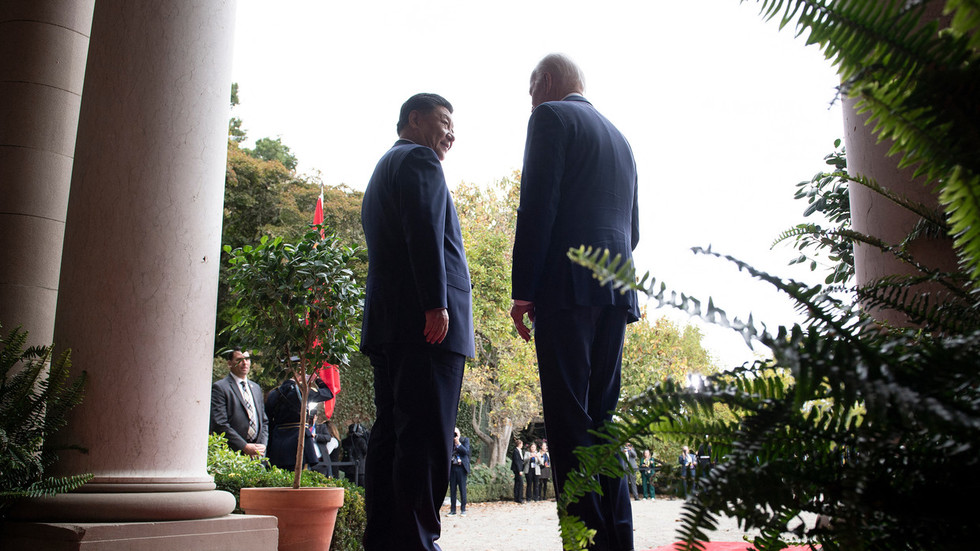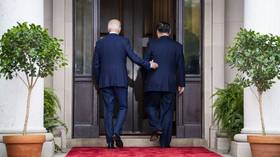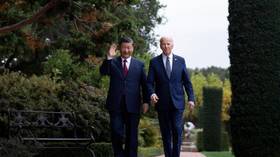
For both leaders, the most important thing at the APEC summit in San Francisco was to be seen as maintaining influence in the Asia-Pacific

© BRENDAN SMIALOWSKI / AFP
On Wednesday Chinese leader Xi Jinping travelled to San Francisco for the APEC summit. Here, he held a meeting with US President Joe Biden and attended a luxury dinner with US officials.
During the meeting, the two sides agreed to constructively improve relations, although they failed to make any substantive breakthroughs on the major issues of disagreement between the two countries.
It was also not without its hiccups, as a deliberately provocative Bloomberg question resulted in Biden effectively calling Xi a “dictator” again, drawing swift condemnation from China. The US president nonetheless attempted to frame the summit as a victory, especially over the political football of fentanyl, as well as the resumption of “military communications” with China, but nonetheless continually framed Beijing as a competitor.
What were these talks all about? While China had a vested interest in stabilizing the relationship and cooling things down, there was also a wider competition at play. Xi Jinping’s attendance was in fact a strong political message not just intended for the US itself, but also aimed at diluting America’s influence on the APEC members when it has the home turf.
APEC, an acronym for Asia-Pacific Economic Cooperation, is an economic bloc which comprises 21 countries in Asia, the Pacific and North America. This includes all of Maritime South East Asia, Australia, New Zealand, Korea, Japan, Taiwan, Canada, Mexico, Peru, Chile and Russia.

This year, the US is the chair and host, so it was inevitable that Washington would try to steer the summit towards projecting its own geopolitical goals in the region, which are targeted at opposing and containing China. It is also important to note that Taiwan, a principal source of tension between Washington and Beijing, also takes part in APEC summits separately from Beijing, which is seen by Western observers as a rare opportunity for the region to be heard at an official level, even though its representatives are civilians rather than its local government officials.
Between the US and China, the summit is in effect a competition for influence over shaping the future of the Asia-Pacific region, which has special consequences for it being in San Francisco. While China has often shunned high-level engagement with the US by playing hard to get and using hardball negotiating tactics, in the case of the APEC summit you have to be in the game to win it. If China doesn’t send its leader, then the US subsequently gains more power in shifting the agenda.
However, through attending, Xi Jinping has escalated the political stakes for the other countries involved by stressing the importance of the event in diplomatic terms, and therefore creating more equilibrium between the US and China, showing of course just how much significance China places on not being diplomatically isolated in this highly consequential region. Thus, the decision was made by Xi to go face to face.
In terms of individual relations between the two countries, the event as a whole and its outcomes are arguably a positive development given the negative trajectory that has occurred, especially at the start of this year. This doesn’t mean the bilateral ties do not have a ceiling and that was quite clear in the lack of substance in the overall results. The US presidential election is now only a year away, and that’s why Biden didn’t lavish concessions on Xi during this meeting. He agreed to be more constructive, but also framed it in a way that he was getting concessions from China, such as over fentanyl. Beijing has become a scapegoat for America’s addiction problem and the two leaders apparently agreed on working to curb the production of the drug, whose precursors, Washington claims, come from China.

Under no circumstances would Biden allow this meeting to be seen as a “capitulation” to Beijing and because of that, US strategic objectives, be it through domestic pressures or international ones, are not liable to change significantly. While Washington has become more amicable towards Beijing in recent months, toning down hostile rhetoric over issues such as Taiwan, little else has changed. The US continues to blacklist and embargo Chinese technology companies in the semiconductor industry and still pursues its campaign of military encirclement around Beijing by arming Taiwan and egging the Philippines on to escalate tensions in the South China Sea.
None of that is going to change, the US continues to have its sights on China as its largest competitor and seeks to affirmably reshape the international order to secure its permanent dominance. That includes military capabilities, alliances, technology and of course economics and trade. The US may be less hostile to China, but it very much seeks to suppress its rise wherever possible. Therefore, as the joint statement showed, this was about “managing competition” between the two, all the while Biden continues to posture about how he’s being tough on Beijing and defending American interests.
For Xi, the goal is much broader. Not only does he buy China strategic time by at least cooling the waters with the US and preventing a complete deterioration of ties, but in this summit he undoubtedly eyed many more Asia-Pacific leaders with the precise goal of diluting US influence.
This is especially significant since most of APEC members (bar the US) are also members of the CPTPP, the trade bloc which China wants to join, and it has already got Australia on board to publicly support it. However, other nations, such as Japan, remain an obstacle. In this case, Xi’s attendance at APEC is about China’s own diplomatic ambitions rather than truly resetting ties with the US. It’s a big moment, but it is not a strategic reset or escape from the world we now live in, and both sides are very much aware of that.
The statements, views and opinions expressed in this column are solely those of the author and do not necessarily represent those of RT.




